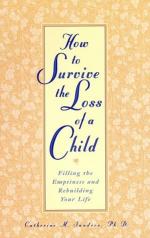|
This section contains 9,132 words (approx. 31 pages at 300 words per page) |

|
SOURCE: “‘Feet so precious charged’: Dickinson, Sigourney, and the Child Elegy,” in Tulsa Studies in Women's Literature, Vol. 13, No. 2, Fall, 1994, pp. 317-38.
In the following essay, Petrino compares the treatment of children's deaths in the poems of Dickinson and Lydia Sigourney, finding Dickinson more likely to question “the validity of consoling fictions.”
Pass to thy Rendezvous of Light, Pangless except for us— Who slowly ford the Mystery Which thou hast leaped across!
Emily Dickinson1
Like many popular nineteenth-century elegists, Dickinson in her letters idealized children as pious exemplars, yet she was uncertain whether their early deaths offered proof of an afterlife. Like her contemporaries, Dickinson extols the dying child as a spiritual guardian, an infant-prophet whose closeness to death makes him peculiarly able to preach to adults. But rather than dwell on an imagined prescience that forms part of its short but spiritually exemplary life, she claims that...
|
This section contains 9,132 words (approx. 31 pages at 300 words per page) |

|


